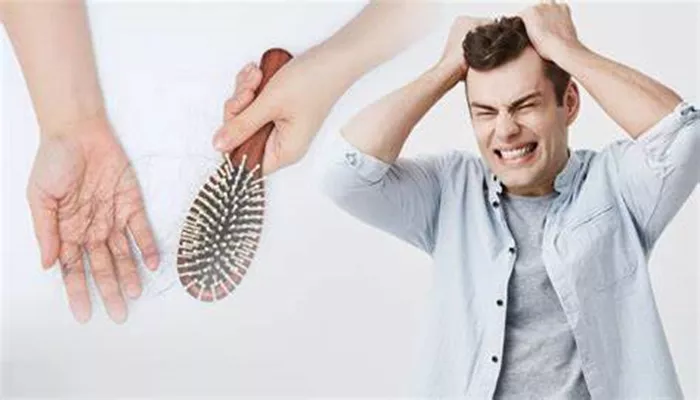Hair loss is a common problem faced by people of all ages today. Whether men or women, hair fall can be distressing for anyone. For some, it may be a temporary issue, while for others, it can lead to baldness. There are several reasons behind hair loss, including genetics, poor lifestyle, hormonal imbalances, stress, improper diet, and certain medical conditions. In this article, we will discuss the main causes of hair loss and their possible solutions in detail.
Genetics (Hereditary Hair Loss)
One of the most common causes of hair loss is genetics, also known as hereditary hair loss. This condition is medically referred to as androgenetic alopecia. It affects both men and women. In men, it is called male pattern baldness, where hair starts receding from the temples and crown, eventually leading to baldness. In women, it is called female pattern hair loss, where hair becomes thinner but complete baldness is rare.
How to Manage It?
Since genetic hair loss cannot be completely prevented, certain treatments can help slow it down. Medications like Minoxidil (Rogaine) and Finasteride (Propecia) are commonly prescribed. In advanced cases, hair transplant surgery can be an effective solution.
Hormonal Imbalances
Hormonal fluctuations play a significant role in hair loss. Conditions like thyroid disorders (hypothyroidism or hyperthyroidism), polycystic ovary syndrome (PCOS), pregnancy, and menopause can trigger excessive hair shedding. In women, a drop in estrogen and progesterone levels can lead to thinning hair.
How to Manage It?
If hormonal imbalance is the cause, consulting a doctor is essential. Thyroid-related hair loss can be controlled with medication. For PCOS, doctors may recommend hormonal therapy or lifestyle changes. Post-pregnancy hair loss is usually temporary and resolves within a few months.
Stress and Anxiety
In today’s fast-paced life, stress has become a major concern. Mental stress, anxiety, and depression can lead to hair loss. Chronic stress can cause a condition called telogen effluvium, where hair enters the shedding phase prematurely. Some people also develop a habit of pulling their hair (trichotillomania), leading to hair damage.
How to Manage It?
Reducing stress through yoga, meditation, and regular exercise can help. Getting enough sleep and maintaining a balanced routine is crucial. If stress is severe, seeking help from a mental health professional is advisable.
Poor Nutrition and Diet
Healthy hair requires proper nutrition. A deficiency in protein, iron, zinc, vitamin D, B vitamins, and omega-3 fatty acids can weaken hair and increase hair fall. Iron deficiency (anemia) is a common cause of hair loss in women. Similarly, low vitamin D levels can negatively affect hair growth.
How to Manage It?
Eating a balanced diet is the best way to prevent hair loss. Include leafy greens, eggs, fish, nuts, lentils, and dairy products in your meals. If there’s a nutritional deficiency, supplements (after consulting a doctor) can help.
Harsh Hair Care and Styling
Using chemical-laden hair products (like harsh shampoos, dyes, and styling gels) can damage hair over time. Excessive heat styling (straightening, curling, blow-drying), tight hairstyles (like ponytails and braids), and frequent bleaching can lead to breakage and hair loss.
How to Manage It?
- Use mild, sulfate-free shampoos.
- Avoid excessive heat styling; use a heat protectant if necessary.
- Let hair dry naturally instead of rubbing with a towel.
- Avoid tight hairstyles that pull on the roots.
Medical Conditions and Medications
Certain illnesses like autoimmune diseases (alopecia areata), scalp infections (ringworm), and chronic illnesses (diabetes, lupus) can cause hair loss. Additionally, some medications (like chemotherapy drugs, blood thinners, and antidepressants) have hair loss as a side effect.
How to Manage It?
If hair loss is due to an underlying disease, treating the condition can help. For medication-induced hair loss, consult a doctor—they may adjust the dosage or suggest alternatives.
Age-Related Hair Loss
As people age, hair naturally becomes thinner and weaker. Hair growth slows down, and follicles may stop producing new hair. This is a normal part of aging but can be more noticeable in some individuals.
How to Manage It?
While aging cannot be reversed, maintaining a healthy diet, reducing stress, and using gentle hair care products can help keep hair stronger for longer.
Conclusion
Hair loss can be distressing, but understanding the cause is the first step toward treatment. Whether it’s genetics, hormones, stress, or poor nutrition, there are ways to manage and even reverse hair loss in many cases. Consulting a dermatologist or trichologist can help determine the exact cause and the best treatment plan for you.
Related Topics:
- Top 5 Reasons for Hair Fall in Summer
- How Can You Stop Excessive Hair Shedding?
- 7 Best Mild Shampoos for Hair Fall


